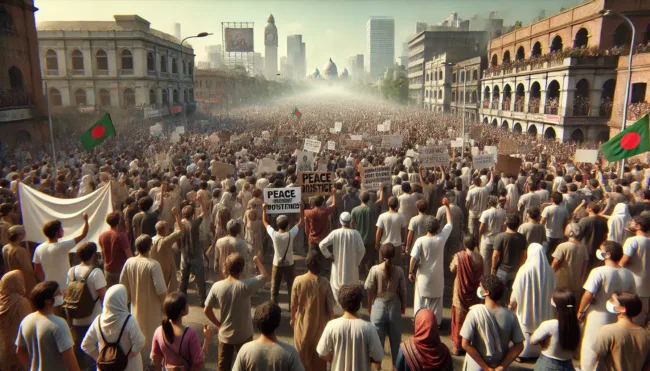Eyes on Bangladesh as Hindu community faces unprecedented surge in communal violence
Recent developments in Bangladesh have seen a distressing escalation in violence against the Hindu community, with their temples, homes, and businesses being targeted amid political upheaval following the resignation of former Prime Minister Sheikh Hasina.
The unfolding crisis
Hindus in Bangladesh, comprising about 8% of the population, have traditionally supported the Awami League party led by Sheikh Hasina. The resignation of Hasina has ignited severe communal tensions, resulting in widespread attacks on the Hindu community. Reports indicate a substantial increase in violence, including arson and physical assaults, sparking major protests in Dhaka and calls for international intervention.

Explore the rising crisis in Bangladesh as Hindus face violence amid political changes. What’s being done?
Immediate responses
In response to the crisis, the Indian government under Prime Minister Narendra Modi has expressed deep concerns, urging the interim government of Bangladesh to ensure the safety and rights of the Hindu minority. Indian-American Congressman Raja Krishnamoorthi has also appealed to the U.S. to support efforts in restoring peace and securing justice for the victims.
Global reactions and future implications
The situation has drawn attention from global leaders and organizations, emphasizing the need for urgent action to protect minorities and restore order. Nobel laureate Muhammad Yunus, now heading the interim government, has promised to prioritize democracy and human rights, aiming to stabilize the nation and prevent further atrocities.
This crisis not only affects the local communities but also poses significant challenges to regional stability and international relations, highlighting the critical role of effective governance in protecting minority rights and ensuring peace.
Expert opinions
Experts from around the world, including Michael Kugelman from the Wilson Center, emphasize that Bangladesh needs to address its internal security issues comprehensively to prevent such crises in the future. The international community’s role is pivotal in supporting Bangladesh through these turbulent times, ensuring that human rights are upheld and that the violence is brought to an immediate halt.
Deepening Crisis: Historical Context and Escalating Violence Against Hindus in Bangladesh
Historical Tensions and Political Shifts
The recent upsurge in violence against Hindus in Bangladesh has roots that extend deep into the country’s historical and political landscape. Historically, Hindus in Bangladesh have faced numerous challenges, from property rights issues under the Vested Property Act to outbreaks of violence during political upheavals. The dramatic shift following the resignation of Sheikh Hasina, who had been seen as a stabilizing force for minority rights, has exposed underlying communal tensions that have simmered for decades.
During Hasina’s administration, there were efforts to improve the relationship between religious communities, including the reinstatement of certain property rights to Hindus that had been eroded over time. However, the political vacuum left by her sudden departure has led to renewed fears and the surfacing of long-standing grievances, pushing some to take advantage of the unrest to target the Hindu minority.
Patterns of Persecution and Response
The pattern of attacks on Hindu communities in Bangladesh is not new. Over the past decades, there have been multiple instances where political instability led to targeted violence. For example, following the 2001 elections, there were reports of widespread attacks on Hindus, which many believed were politically motivated to intimidate and disenfranchise Hindu voters. Similar incidents occurred sporadically when international events inflamed local tensions, such as during the India-Pakistan crises.
In response to the current crisis, local leaders and international figures have stepped up. Nobel laureate Muhammad Yunus, now at the helm of the interim government, has committed to upholding human rights and protecting all citizens regardless of religion. This promise comes as part of an effort to restore international confidence and prevent an exodus of the Hindu population, who fear for their future in Bangladesh.
Community and International Actions
The international community, including India and the United States, has expressed significant concern. Protests in Dhaka and major cities worldwide highlight the global diaspora’s anxiety about the unfolding situation. Social media campaigns, international lobbying, and diaspora-led fundraisers are in full swing, aiming to draw attention to the plight of Bangladesh’s Hindus and pressure international bodies like the United Nations to intervene.
Insights on the Road Ahead
Experts suggest that the resolution to this crisis lies in comprehensive political reform and the restoration of a robust legal framework that can protect minority rights effectively. Michael Kugelman and other regional analysts emphasize that without a stable government that prioritizes the rule of law, the cycle of violence and persecution may continue, potentially destabilizing the South Asian region further.
As Bangladesh grapples with these challenges, the eyes of the world remain fixed on its ability to navigate this crisis, ensuring that the rights and safety of all its citizens are at the forefront of any political solution. The outcome will not only affect those immediately involved but also set a precedent for how similar situations might be handled globally in the future.
Discover more from Business-News-Today.com
Subscribe to get the latest posts sent to your email.

